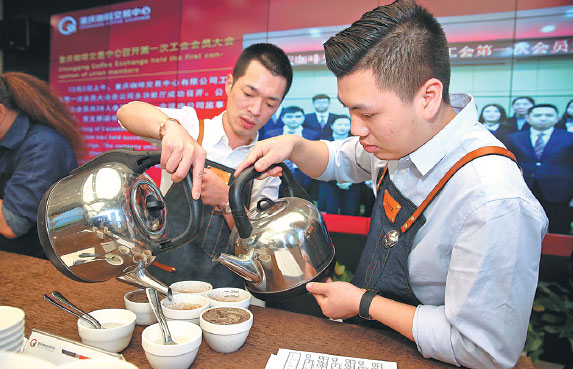Chongqing coffee exchange causes stir
Chinese market is expected to reach $87 billion in 10 years, statistics show
Southwest China's Chongqing municipality has rapidly expanded its coffee business by linking up with countries and regions involved in the Belt and Road Initiative.
According to the Chongqing Coffee Exchange, a coffee trading center that was established in June, its spot trading volume of coffee reached $764 million by the end of the first quarter this year, and it also becomes the largest online coffee exchange platform in China.
China's coffee consumption has been growing by 20 percent every year, and the size of the coffee market is expected to reach about $87 billion in 10 years from the current$14.5 billion, according to figures from the center.
Meanwhile, China's coffee production is also growing quickly, with the total production expected to exceed 185,000 tons by 2020. In Chongqing's neighboring province Yunnan, the planting area for coffee is more than 667,000 hectares.
Feng Yue, chairman of the center's main initiator Chongqing Energy Group, said that the city has inherent advantages for developing the coffee trading business, as it naturally connects the coffee production bases with the consumption markets.
"Geographically, Chongqing is close to coffee production centers such as Southeast Asia, South Asia and China's Yunnan province, so coffee from these countries and regions could be quickly sent to Chongqing either through shipping or highways," he said.
Also, by using the Chongqing-Xinjiang-Europe freight train, which leaves from Chongqing, traveling more than 11,000 kilometers cross Kazakhstan, Russia, Belarus, Poland and arrives at Duisburg, Germany, the city could send coffee products directly to the main consumption market of Europe in 12 to 13 days.
Moreover, some products could also be sent to other cities in China and even Japan along the Yangtze River.
Supply chain
Feng said that since the Chongqing Coffee Exchange was established, it has attracted more than 180 member companies that cover the whole supply chain of the industry, including coffee planting, collection, trading and deep processing.
"Our target is to make Chongqing a global trading center for coffee," he said. "At present China's coffee industry doesn't have much say in global scope and Chinese coffee companies don't have much ability to negotiate prices during trading. We want to change the situation."
Yin Chao, general manager of the Laos Changshengda Coffee Ltd, said that the company co-established with the Chongqing Coffee Exchange in Laos a coffee base for the planting and primary processing of coffee products. The planting area in Laos is about 12,000 hectares, which will be finished planting in 2019, and the expected annual production is more than 10,000 tons.
Yin said that Laos is close to Chongqing and has weather conditions that are ideal for coffee planting. And Chongqing has a developed transportation network, especially the railway, which could help coffee products to be sent to main consumptions markets, which makes his business promising.
Hu Xizhe, agricultural assistant of the Netherlands Consulate General in Chongqing, said that they are helping Chongqing Coffee Exchange to invest in the Netherlands and expand to Europe by opening coffee stores and investing in projects in the Netherlands.
"Europe is a large coffee consumption market," he said."Chongqing Coffee Exchange could bring China and Southeast Asia's coffee products to Europe through the railway, which is timing-saving and cost-saving. It would be a good opportunity for all sides."
Feng said that in the future, the center will not only be a trading platform but will offer various services to member companies. It would be a financing platform that could support coffee companies, as well as providing cultural demonstrations and training.
chenyingqun@chinadaily.com.cn
|
Workers prepare coffee for guests at the Chongqing Coffee Exchange on April 13. |



















